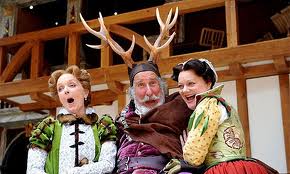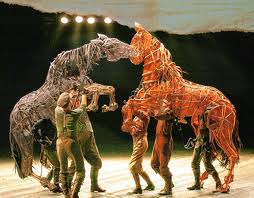
 Just returned from a revivifying trip to the UK. Saw a couple of shows while I was there, which couldn’t have been more different in terms of the emotions they provoked in me:
Just returned from a revivifying trip to the UK. Saw a couple of shows while I was there, which couldn’t have been more different in terms of the emotions they provoked in me:
The Merry Wives of Windsor at The Globe: Mark Shenton, a wonderful theatre commentator for The Stage, theatre junkie and all-round mensch, invited me to be his guest at the press night performance of Shakespeare’s one-joke comedy. The one-joke in question is about fat people, which gets old pretty quickly. But the production, which features Christopher Benjamin as the play’s overweight anti-hero Falstaff, moves swiftly and left me feeling elated by the end. Strong ensemble performances and director Christopher Luscombe’s energetic direction, which sees the actors running all over the place including a boardwalk in the middle of the groundlings area and the musicians’ balcony, keep the action bouncing along. But the acting often falls prey to too much hamming. One example of this is the several occasions when Mistresses Ford and Page talk about Falstaff behind his back with the intention of having him hear what they’re saying. On the other hand, there are one or two startling moments of comedic styling. My favorite is when the male actors treat a corset from the laundry basket where Falstaff is supposedly secreted like it’s diseased. They throw the object between them with disgust and can’t wait to get rid of it. The kicker occurs when the corset finds its way into the hands of the effete Slender, who reacts completely differently to the rest of the male company: He shows genuine interest in the garment.
War Horse at The New London Theatre: The National Theatre’s intelligent and deeply affecting production of a play adapted by Nick Stafford based on a novel by Michael Morpurgo made me cry. I think this has happened only once before to me at the theatre. The other time, the actors on stage were practicing very strange hypnotism effects on the audience, which is what caused the tears to flow, I’m pretty sure. Art about animals often pulls at people’s heartstrings it’s true, but Marianne Elliott and Tom Morris’ production creates an impact not so much because of the animal-focused narrative (the play follows the fortunes of horses used in battle in the First World War) but because of the overwhelming combination of puppets and humans on stage and the epic nature of the storytelling which makes the most of dramatic moments of pathos and near-tragedy. The sinewy, life-size horse puppets created in collaboration with Handspring Puppet Company provide much of the production’s visual impact. The horses seem extremely real because the humans that manipulate the puppets have captured equestrian movements and sounds that are utterly life-like, from the way in which the creatures eat to their nervous movements when in the presence of people they don’t trust. The production is kinetic and intense. It’s an emotional ride as we learn to care deeply both for the animals forced into combat and the humans whose lives are also at risk from warfare. The dramaturgy gets close to melodrama especially at the end (which I don’t want to spoil so I won’t say anything more about it.) We come close to a state of devastation in the final moments, which leads to a feeling of catharsis which is more releasing than anything I’ve ever experienced in a theatre before.
